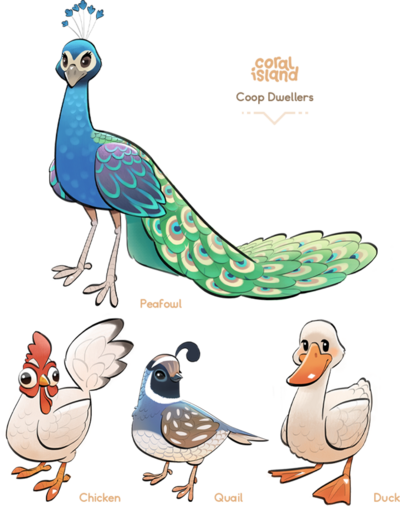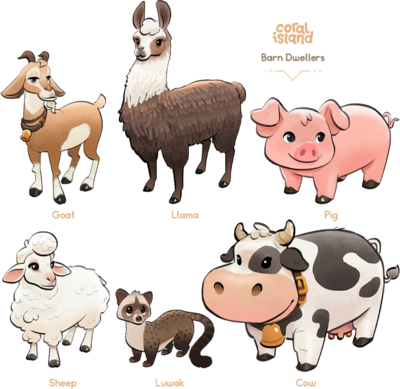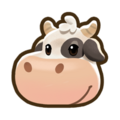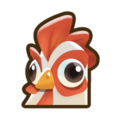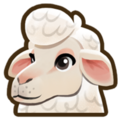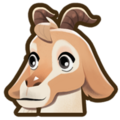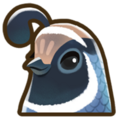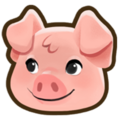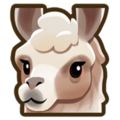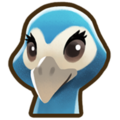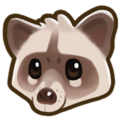Farm animal: Difference between revisions
No edit summary |
No edit summary |
||
| Line 19: | Line 19: | ||
|- | |- | ||
|F | |F | ||
| | |<gallery mode="nolines"> | ||
File:Cow2.png | |||
</gallery> | |||
|[[Cow]] | |[[Cow]] | ||
|2,500 {{g}} | |2,500 {{g}} | ||
| Line 28: | Line 30: | ||
|- | |- | ||
|F | |F | ||
| | |<gallery mode="nolines"> | ||
File:Chicken2.png | |||
</gallery> | |||
|[[Chicken]] | |[[Chicken]] | ||
|600 {{g}} | |600 {{g}} | ||
| Line 36: | Line 40: | ||
|- | |- | ||
|E | |E | ||
| | |<gallery mode="nolines"> | ||
File:Sheep2.png | |||
</gallery> | |||
|[[Sheep]] | |[[Sheep]] | ||
|2,000 {{g}} | |2,000 {{g}} | ||
| Line 44: | Line 50: | ||
|- | |- | ||
|E | |E | ||
| | |<gallery mode="nolines"> | ||
File:White Duck.png | |||
</gallery> | |||
|[[Duck]] | |[[Duck]] | ||
|1,000 {{g}} | |1,000 {{g}} | ||
| Line 52: | Line 60: | ||
|- | |- | ||
|D | |D | ||
| | |<gallery mode="nolines"> | ||
File:Goat.png | |||
</gallery> | |||
|[[Goat]] | |[[Goat]] | ||
|8,000 {{g}} | |8,000 {{g}} | ||
| Line 60: | Line 70: | ||
|- | |- | ||
|D | |D | ||
| | |<gallery mode="nolines"> | ||
File:Quail.png | |||
</gallery> | |||
|[[Quail]] | |[[Quail]] | ||
|5,000 {{g}} | |5,000 {{g}} | ||
| Line 68: | Line 80: | ||
|- | |- | ||
|C | |C | ||
| | |<gallery mode="nolines"> | ||
File:Pig.png | |||
</gallery> | |||
| | | | ||
[[Pig]] | [[Pig]] | ||
| Line 77: | Line 91: | ||
|- | |- | ||
|B | |B | ||
| | |<gallery mode="nolines"> | ||
File:Llama2.png | |||
</gallery> | |||
|[[Llama]] | |[[Llama]] | ||
|15,000 {{g}} | |15,000 {{g}} | ||
| Line 85: | Line 101: | ||
|- | |- | ||
|B | |B | ||
| | |<gallery mode="nolines"> | ||
File:Peafowl.png | |||
</gallery> | |||
|[[Peafowl]] | |[[Peafowl]] | ||
|20,000 {{g}} | |20,000 {{g}} | ||
| Line 93: | Line 111: | ||
|- | |- | ||
|A | |A | ||
| | |<gallery mode="nolines"> | ||
File:Luwak.png | |||
</gallery> | |||
|[[Luwak]] | |[[Luwak]] | ||
|30,000 {{g}} | |30,000 {{g}} | ||
| Line 220: | Line 240: | ||
''Baby animals are not available in 1.0'' | ''Baby animals are not available in 1.0'' | ||
Baby animals cannot yield produce. However, baby animals can grow into adults after a few days, and then start producing. Some baby animals can be bought in a Ranch shop for a cheaper price than the adults. Some others must be bred only. Bred-only animals are rare animals and intended to be ranchers’ endgame activity. | Baby animals cannot yield produce. However, baby animals can grow into adults after a few days, and then start producing. Some baby animals can be bought in a Ranch shop for a cheaper price than the adults. But needs time to grow up before they can produce. Some others must be bred-only. Bred-only animals are rare animals and intended to be ranchers’ endgame activity. | ||
==Animal Sickness== | ==Animal Sickness== | ||
Revision as of 08:24, 2 August 2023
Ranching is a game mechanic that involves raising farm animals and collecting their products. The player can raise animals after building a coop or a barn. The animals can be purchased at the local ranch, north of the player farm.
Pets and Mythical Pets are types of animal companions that are separate from standard farm animals.
Animals
Farm animals provide players with resources that can be processed into artisan products or sold directly. All farm animals require players to build a farm building to house them, such as a coop or a barn.
Animals also unlocked via Town Rank. The more player progress, the more animal they can buy.
Animals require a special place to live on a player’s farm. Either it’s a coop, barn, or stable. To be able to ranch, the player must first buy the housing. Animal housing can be bought in Carpenter, at a cost of some materials & money.
| Town Rank | Icon | Animal | Animal price | Produce Time | Produce |
|---|---|---|---|---|---|
| F | Cow | 2,500 |
1 Day | Milk
Large Milk | |
| F | Chicken | 600 |
1 Day | Egg
Large Egg | |
| E | Sheep | 2,000 |
2 Days | Wool
Large Wool | |
| E | Duck | 1,000 |
2 Days | Duck Egg
Large Duck Egg | |
| D | Goat | 8,000 |
2 Days | Goat milk
Large Goat Milk | |
| D | Quail | 5,000 |
4 Days | Quail Egg
Large Quail Egg | |
| C | 12,000 |
3 Days | Black truffle
White Truffle | ||
| B | Llama | 15,000 |
4 Days | Llama Wool
Large Llama Wool | |
| B | Peafowl | 20,000 |
4 Days | Feather
Large feather | |
| A | Luwak | 30,000 |
2 Days | Gesha Coffee Bean
Large Gesha Coffee Bean |
General mechanics
Hearts
All animals have hearts just like NPCs. Increasing hearts can be done by petting them and some other interactions specific to each animal, such as milking or shearing. Inspecting an animal once other interactions are complete will show an animals age, mood, and number of hearts (max 10).
As an animal's hearts increase, it will increase the percentage of player getting large product
| Bad Mood | Neutral Mood | Happy mood | ||||
|---|---|---|---|---|---|---|
| Heart Level | Small | Large | Small | Large | Small | Large |
| 0 Heart | 100.0% | 0.0% | 99.5% | 1% | 89.5% | 10.5% |
| 1 Heart | 100.0% | 0.0% | 97% | 3% | 86.8% | 13.2% |
| 2 Heart | 100.0% | 0.0% | 92% | 8% | 81.5% | 18.5% |
| 3 Heart | 95.7% | 4.3% | 85% | 15% | 73.5% | 26.5% |
| 4 Heart | 86.4% | 13.6% | 75% | 25% | 62.8% | 37.2% |
| 5 Heart | 74.9% | 25.1% | 62% | 38% | 49.5% | 50.5% |
| 6 Heart | 63.6% | 36.4% | 50% | 50% | 35.9% | 64.1% |
| 7 Heart | 58.7% | 41.3% | 44% | 56% | 28.5% | 71.5% |
| 8 Heart | 53.2% | 46.8% | 37% | 63% | 20.1% | 79.9% |
| 9 Heart | 46.9% | 53.1% | 29% | 71% | 10.6% | 89.4% |
| 10 Heart | 40.0% | 60.0% | 20% | 80% | 0.0% | 100.0% |
Quality
Player can increase product quality by upgrading hay in Ling's Lab.
This will require player to bring some item and money to Ling. In a few days, the animal's food qality will automatically be upgraded. Increasing hay quality means better product quality, happier animal and higher sell price.
Baby Animals
Baby animals are not available in 1.0
Baby animals cannot yield produce. However, baby animals can grow into adults after a few days, and then start producing. Some baby animals can be bought in a Ranch shop for a cheaper price than the adults. But needs time to grow up before they can produce. Some others must be bred-only. Bred-only animals are rare animals and intended to be ranchers’ endgame activity.
Animal Sickness
Animals can become sick if they are not fed for 3 days straight, or if they have been cold or hot for three consecutive days during summer or winter. Additionally, if an animal is in a bad mood for three straight days, regardless of the season, it will also become sick. When an animal is sick, it will not produce and will require animal medicine to recover. It is important to note that a maximum of 50% animals in a building can be sick at a time. The animal will recover after 4 days, but friendship points will not increase while the animal is sick.
